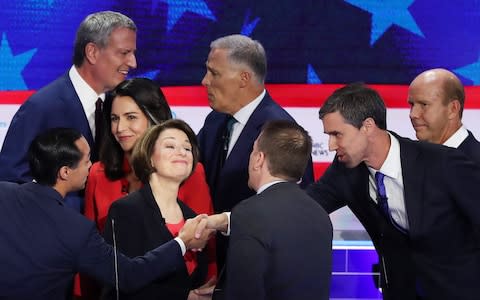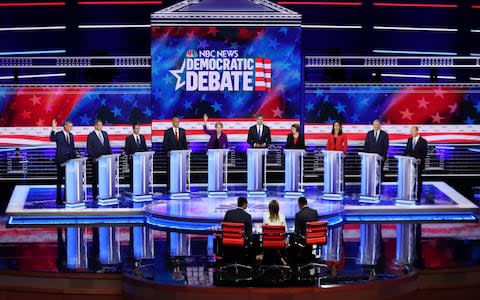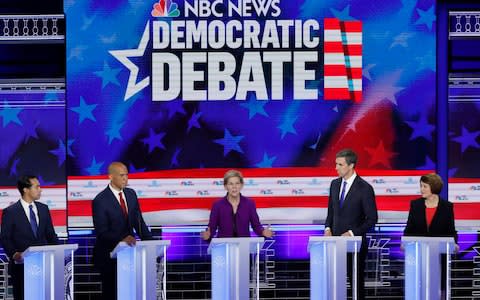Democrat White House hopefuls clash on immigration and healthcare in feisty first campaign debate

Democratic presidential hopefuls split over whether to end private health care, decriminalise illegal migration and rejoin the Iran nuclear deal as clear divisions emerged in the first debate of the campaign.
During a series of feisty exchanges, the 10 candidates who appeared together clashed on how far they would go to tackle climate change, end gun violence in America and take on the country’s corporate giants.
When asked to name the greatest geopolitical threat some half a dozen different answers were given including China, Russia, nuclear war, climate change and - to cheers and applause from the audience - Donald Trump.
The clashes over the two-hour debate in Miami, Florida, provided the clearest evidence yet of how candidates will attempt to stand out and which issues will define the race for the Democratic Party’s 2020 presidential nomination.
There were moments of unity, most notably the demand echoed by candidates to win back support from working class voters who backed Mr Trump and address the economic pain they are feeling.
There was also universal disgust at the shocking photograph of a father and daughter lying dead in a river after crossing the border into America which emerged this week, with one candidate saying: “It should p--- us all off.”

While there were attacks on Mr Trump, the current US president, his name was largely absent from the debate as the candidates were repeatedly grilled on policy by news presenters from NBC, the broadcaster hosting the event.
Mr Trump for his part was following along from Air Force One as he travelled to Japan for the G20 summit but appeared to soon grow tired, after half an hour tweeting:
BORING!
— Donald J. Trump (@realDonaldTrump) June 27, 2019
Just 10 of the two dozen Democrats running for the right to take on Mr Trump in the 2020 election appeared on stage. Another 10 are debating on Thursday while others failed to make the cut.
Among the group debating on Wednesday were prominent politicians including senators Elizabeth Warren and Cory Booker, New York mayor Bill de Blasio and former Texan congressman Beto O'Rourke.
The others on stage were congressmen Julian Castro, Tulsi Gabbard and Tim Ryan, senator Amy Klobuchar, Washington governor Jay Inslee and former congressman John Delaney.
With so many candidates and such little time, most seemed to take the opportunity to spell out who they are and what they stood for to the millions of TV viewers, as well as outlining their stances on key policies.

There was no jaw-dropping moment and no clear winner or loser, though analysis by the FiveThirtyEight political website showed that more established candidates - Mr Booker, Mr O'Rourke, Ms Warren - spoke much more than lesser-known rivals.
But what the debate did do was make clear some of the key dividing lines that will dominate the months of campaigning ahead before the first states start to vote for their nominee in February 2020.
Healthcare was one. Just two candidates - Mr De Blasio and Ms Warren - raised their hands when asked who would abolish private healthcare in America in favour of a public plan.
Their stance was attacked by other, more moderate candidates - such as Ms Gabbard and Mr Delaney - who insisted it would be wrong to strip people of their private pension plans against their will.
Immigration was another dividing line. Mr Castro, the only Latino American in the race, challenged other candidates to join him in promising to repeal “Section 1325”, which makes it a crime to enter America without legal papers.
Top geopolitical threat:
Delaney: China/nukes
Inslee: Trump
Gabbard: Nuclear war
Klobuchar: China/Iran
O'Rourke: Climate change
Warren: Climate change
Booker: Nuclear proliferation, climate change
Castro: China, climate change
Ryan: China
De Blasio: Russia https://t.co/dWO8XCQHsj— Bloomberg Politics (@bpolitics) June 27, 2019
The proposal - which would mean crossing into America would no longer be a federal crime but just a civil offence - was endorsed by some others on the stage but not Mr O'Rourke, who is from the US-Mexico border town of El Paso.
A third area of difference was Iran. When asked whether candidates would sign the Iran nuclear deal secured by former president Barack Obama in 2015 in its original form, just half of the candidates raised their hands.
Some argued that they wanted to see more checks on Iran’s use of ballistic missile tests or longer delays in their abilities to enrich uranium before resigning the deal - effectively echoing Mr Trump’s criticisms.

One of the starkest differences came when candidates were challenged to name in a few words what the greatest geopolitical threat facing America was today.
Four of the 10 candidates mentioned China and climate change, three mentioned nuclear weapons and one mentioned Russia. Plus one, Mr Inslee, triggered cheers from the audience when he said Mr Trump.
Throughout the night there were some stand-out lines. Ms Klobuchar triggered applause when she said of Mr Trump and his tweeting: "I don't think we should conduct foreign policy in our bathrobe at 5 o'clock in the morning."
There was a lot of Spanish speaking at the first #DemocraticDebate on @NBCNews@BetoORourke@CoryBooker@JulianCastrohttps://t.co/P5J6FAHqqtpic.twitter.com/Z6yLxgfM58
— NBC News NOW (@NBCNewsNow) June 27, 2019
Mr Castro appeared close to tears as he spoke about the photograph of the father and daughter who died trying to migrate into America, saying: "It's heartbreaking. It should also p--- us all off.”
Mr Booker said of the image and the border situation: "When people come to this country they do not leave their human rights at the border." Mr De Blasio added: “Every American should feel it in their heart.”
One area of unity was on the need to win back working class voters who abandoned the party for Mr Trump - especially in the mid-western states which went Republican after decades of voting for the Democrats.
Most candidates talked about the need to ensure not just the rich benefited from the booming US economy, address the decline of manufacturing jobs and bring about wage growth for average Americans.
At least three candidates - Mr Booker, Mr Castro and Mr O'Rourke - spoke in Spanish at some point during the debate, especially on questions that discussed migration. The city hosting the debate, Miami, has many Spanish speakers.
Despite speculation that Mr Trump would live tweet the debate, in the end he picked out just one issue - a microphone malfunction that led to an unexpected advertising break being called.
He tweeted:
.@NBCNews and @MSNBC should be ashamed of themselves for having such a horrible technical breakdown in the middle of the debate. Truly unprofessional and only worthy of a FAKE NEWS Organization, which they are!
— Donald J. Trump (@realDonaldTrump) June 27, 2019
His failure to pick out any one Democrat or debate topic in the immediate aftermath perhaps reflected the lack of a standout moment or candidate from the debate.
On Thursday 10 more hopefuls, including former vice president Joe Biden and prominent left-winger Bernie Sanders, will take to the same stage, which had the White House as its backdrop.
A debate between candidates will take place almost every month for the rest of the year, with voting in the primaries beginning in February 2020.

